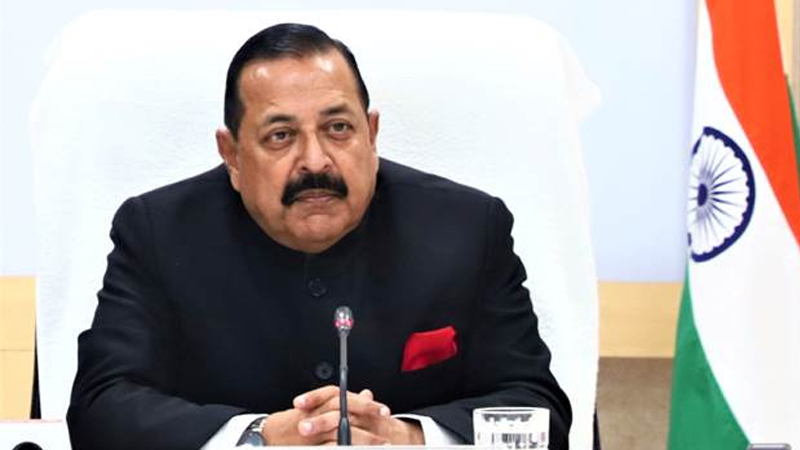With the central theme — School to Startups- Igniting Young Minds to Innovate — the National Technology Week (May 11-14) brought together 12 ministries and the technology development board to celebrate engineers, scientists, and innovators who have made key technological advancements.
Dr. Jitendra Singh
India celebrated its National Technology Day (NTD) on May 11, marking an opportunity to appreciate the visionary leadership of Prime Minister (PM) Narendra Modi, who has championed science, technology, and innovation since 2014. With the central theme — School to Startups- Igniting Young Minds to Innovate — the National Technology Week (May 11-14) brought together 12 ministries and the technology development board to celebrate engineers, scientists, and innovators who have made key technological advancements. At the core of these celebrations was the Atal Innovation Mission (AIM), designed to foster a culture of innovation and entrepreneurship, and inculcate scientific temper in young minds.
AIM, established under NITI Aayog, has made significant strides in fostering a robust entrepreneurial landscape in India. AIM achieves its vision through programmes such as Atal Tinkering Labs (ATLs) for schools, Atal Incubation Centres (AICs) for start-ups and entrepreneurs, Atal Community Innovation Centres (ACICs) for grassroots innovation, Atal New India Challenges (ANICs) for national-impact innovations, and Mentor India for change agents.
The Council of Scientific & Industrial Research (CSIR) plays a crucial role in supporting not only industrial R&D for established industries but also startups and micro, small and medium enterprises (MSMEs). CSIR’s recent efforts in the startup ecosystem include showcasing selected technologies to boost collaboration confidence, highlighting startups incubated in CSIR laboratories, and conducting
The Council of Scientific & Industrial Research (CSIR) plays a crucial role in supporting not only industrial R&D for established industries but also startups and micro, small and medium enterprises (MSMEs)
interactive lecture sessions to strengthen CSIR-industry relationships and gather valuable feedback from startups.
The National Institute of Ocean Technology (NIOT), an autonomous body under the ministry of earth sciences, is dedicated to designing, developing, and demonstrating technologies for the sustainable utilisation of ocean resources. With a significant impact on the industry, NIOT has signed 32 technology licensing agreements and is set to finalise two more in May. The department of atomic energy (DAE) has established itself as a technology powerhouse. DAE contributes to carbon-free electricity, health care, food preservation, crop variety development, and environmental waste management.
The Indian Space Research Organisation (ISRO) is promoting space education through initiatives such as Space Tutor, which involves 55 non-governmental organisations and educational institutions establishing space clubs and organising hands-on events. They are also building capacity in the geospatial domain, providing training on satellite data usage for various applications. Space science data from missions such as Chandrayaan and Mangalyaan is used for hackathons and workshops. The Space on Wheels programme consists of mobile space museums, aimed at promoting awareness and education for rural students, in collaboration with institutions and organisations.
Over the past eight years, India’s bio-economy has grown from $10 billion to $80 billion, increasing the number of biotech startups to 5,300. The department of biotechnology (DBT) and the Biotechnology Industry Research Assistance Council (BIRAC) have supported over 4,000 startups and 2,500 companies, resulting in 1,200 Intellectual Property filings and 800 biotech products reaching the market.
India is now a global leader in vaccine development, with initiatives such as Mission COVID Suraksha and the development of vaccines like ZyCoV-D. In agriculture, 50 crop varieties have been developed using genomic tools. The One Health Initiative and bioenergy projects support animal biotechnology, and clean energy. Capacity-building programmes such as Star College Scheme and Biotech Industrial Training Programme promote skill development and infrastructure. Finally, the Indian Biological Data Centre (IBDC) ensures the storage and sharing of biological data. The department of science & technology (DST) is India’s nodal agency for promoting
India is now a global leader in vaccine development, with initiatives such as Mission COVID Suraksha and the development of vaccines like ZyCoV-D
Science and Technology, elevating the country’s ranking to the top 50 innovative economies globally. DST fosters innovation and entrepreneurship through various programmes.
India’s innovation and entrepreneurship ecosystem is thriving, thanks to various policy initiatives and programmes aimed at developing the nation by 2047. ATLs inspire the younger generation to engage in scientific research, becoming change agents for India’s growth. The Atmanirbhar Bharat mission serves as a bridge to New India, emphasising demand, supply, and manufacturing. The Make in India initiative focuses on fostering innovation, investment, skill development, and world-class manufacturing infrastructure. PM Modi’s leadership has played a significant role in steering India towards this path of innovation.
NTD celebrations reminded us of the immense potential India holds in various fields. Let us pledge to support and encourage our scientists, innovators, and entrepreneurs in their endeavours to create a brighter future for India.
(The Writer is Union Minister of State (Independent Charge) Science & Technology; MoS PMO, Personnel, Public Grievances, Pensions, Atomic Energy and Space)


